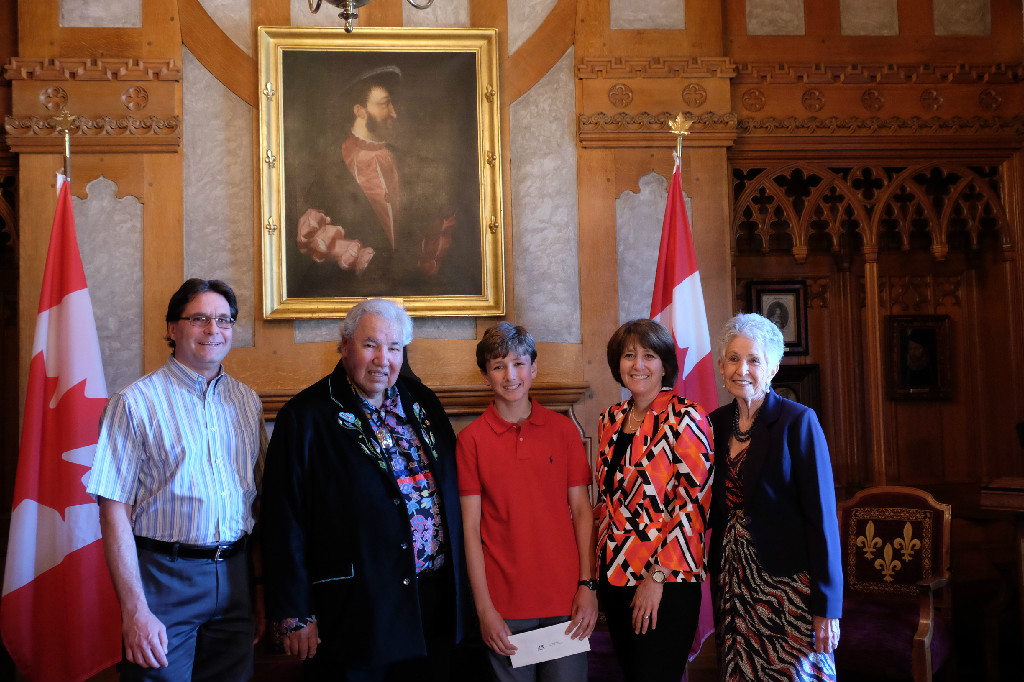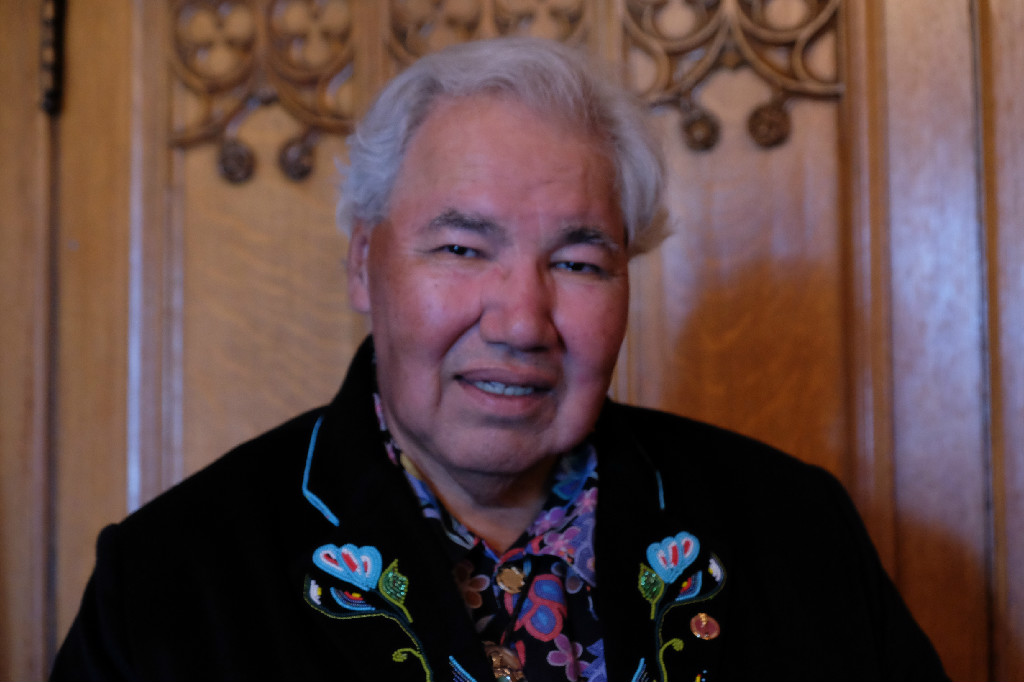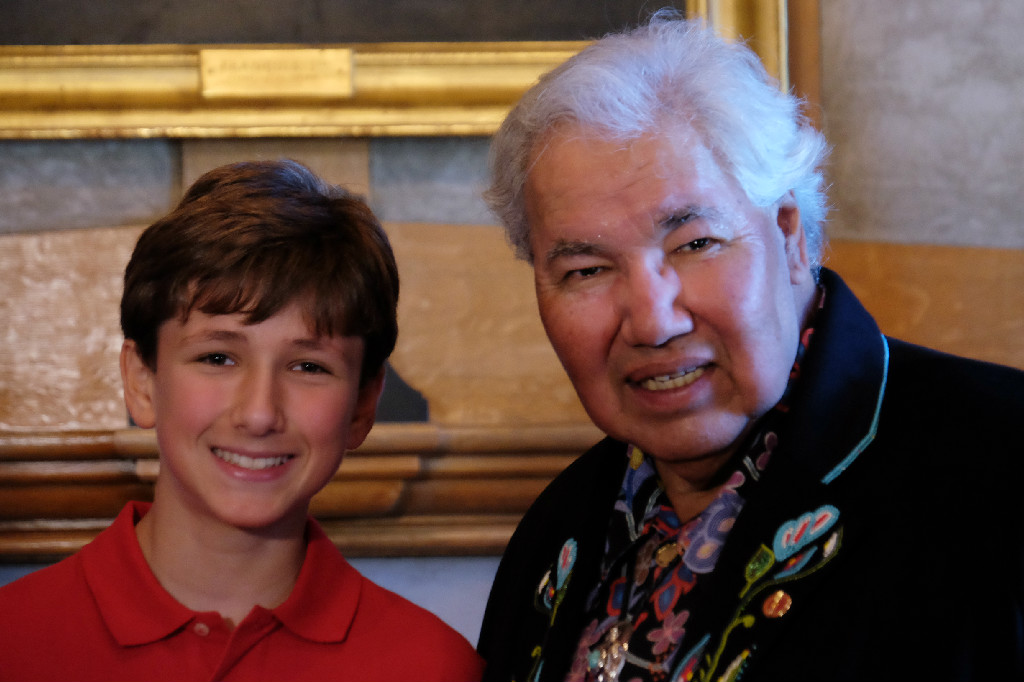Prize winner meets hero, Senator Sinclair

Jeremy Hornung, a 12-year-old boy from Ottawa, recently met with Senator Murray Sinclair — the man who inspired his award-winning essay.
Jeremy is this year’s Grand Prize Winner of the national Lives That Make a Difference essay contest, hosted by A&E Networks.
The A&E contest has run for more than a decade; each year about 2,000 students in grades 5 to 12 submit essays for a chance to win $3,000. This year, essays about Indigenous issues were particularly prevalent and many contestants were drawn to Senator Sinclair for his work in advancing Indigenous causes.

Senator Sinclair chaired the Truth and Reconciliation Commission, which sought to acknowledge the injustices and harms experienced by Aboriginal peoples while also laying the groundwork for new relationships built on a foundation of mutual recognition and respect. He also served as Manitoba’s first Aboriginal judge.
During the gathering, Senator Sinclair announced he was putting forward the essay to be preserved in the Senate Archives.
In their own words

I’m Jeremy from Ottawa, I first learnt about Senator Sinclair when I was at the closing ceremony of the Truth and Reconciliation Commission and I was really impressed, he really stood out to me. I was also impressed about what he had done with the Truth and Reconciliation Commission, so I did some research and he became an idol for me. And so that’s what inspired me to write my essay on him. Now it feels great to have won, but I don’t really know what I’m going to do with the money!
Jeremy Hornung

This event involving A & E’s award to this young student, Jeremy, for the essay he’s written, is a good indication of how institutions like A & E can contribute to reconciliation in Canada. This young man has written an essay in which he is talking about the importance of leadership and the importance of indigenous and non-indigenous people coming together. The topic that he chose was the work of the Truth and Reconciliation Commission and my role as the chair of it, and so I greatly appreciated the opportunity to be a part of this and to share the day with him.
Senator Murray Sinclair
Read Jeremy’s essay below
*****
Justice: what does it really mean? Equality? Truth? Peace? In writing this essay I discovered it means so much more than that.
Justice Murray Sinclair has dedicated his life to helping aboriginals. He is Manitoba’s first ever aboriginal judge. He is chair of the Truth and Reconciliation Commission of Canada (TRC) and has touched the lives of many Canadians.
The TRC’s goal was to promote healing, forgiveness and reconciliation. Mr. Sinclair and others talked to survivors of residential schools about their stories, which are often filled with cruelty and sadness, to let Canada know what happened. I was at the closing ceremony for this commission and I expected angry faces of people still wanting apologies but instead I found they were ready to move on. I knew then that it had been a success. Still Mr. Sinclair believed there was more work to be done.
He is an idol for me because he agreed to step up to mend a broken relationship that others would not dare fix. The Aboriginal people have survived unthinkable hardship at residential schools and Mr. Sinclair agreed to take the lead in helping them to heal. He is a true leader to me. His hard work even earned him multiple awards such as the Egerton Ryerson award for dedication to public education in 2015.
Mr. Sinclair has changed the way Canadians look at aboriginals. Even the ones with the hardest hearts turn soft when they see stories he brought into the light. They come to understand what these people have been through and some step up and join him to fight for this cause. Yet even after accomplishing so much in the eyes of Canadians like me, Mr. Sinclair believes this is just the beginning of what he must do.

Related articles
Tags
Committee news
Prize winner meets hero, Senator Sinclair

Jeremy Hornung, a 12-year-old boy from Ottawa, recently met with Senator Murray Sinclair — the man who inspired his award-winning essay.
Jeremy is this year’s Grand Prize Winner of the national Lives That Make a Difference essay contest, hosted by A&E Networks.
The A&E contest has run for more than a decade; each year about 2,000 students in grades 5 to 12 submit essays for a chance to win $3,000. This year, essays about Indigenous issues were particularly prevalent and many contestants were drawn to Senator Sinclair for his work in advancing Indigenous causes.

Senator Sinclair chaired the Truth and Reconciliation Commission, which sought to acknowledge the injustices and harms experienced by Aboriginal peoples while also laying the groundwork for new relationships built on a foundation of mutual recognition and respect. He also served as Manitoba’s first Aboriginal judge.
During the gathering, Senator Sinclair announced he was putting forward the essay to be preserved in the Senate Archives.
In their own words

I’m Jeremy from Ottawa, I first learnt about Senator Sinclair when I was at the closing ceremony of the Truth and Reconciliation Commission and I was really impressed, he really stood out to me. I was also impressed about what he had done with the Truth and Reconciliation Commission, so I did some research and he became an idol for me. And so that’s what inspired me to write my essay on him. Now it feels great to have won, but I don’t really know what I’m going to do with the money!
Jeremy Hornung

This event involving A & E’s award to this young student, Jeremy, for the essay he’s written, is a good indication of how institutions like A & E can contribute to reconciliation in Canada. This young man has written an essay in which he is talking about the importance of leadership and the importance of indigenous and non-indigenous people coming together. The topic that he chose was the work of the Truth and Reconciliation Commission and my role as the chair of it, and so I greatly appreciated the opportunity to be a part of this and to share the day with him.
Senator Murray Sinclair
Read Jeremy’s essay below
*****
Justice: what does it really mean? Equality? Truth? Peace? In writing this essay I discovered it means so much more than that.
Justice Murray Sinclair has dedicated his life to helping aboriginals. He is Manitoba’s first ever aboriginal judge. He is chair of the Truth and Reconciliation Commission of Canada (TRC) and has touched the lives of many Canadians.
The TRC’s goal was to promote healing, forgiveness and reconciliation. Mr. Sinclair and others talked to survivors of residential schools about their stories, which are often filled with cruelty and sadness, to let Canada know what happened. I was at the closing ceremony for this commission and I expected angry faces of people still wanting apologies but instead I found they were ready to move on. I knew then that it had been a success. Still Mr. Sinclair believed there was more work to be done.
He is an idol for me because he agreed to step up to mend a broken relationship that others would not dare fix. The Aboriginal people have survived unthinkable hardship at residential schools and Mr. Sinclair agreed to take the lead in helping them to heal. He is a true leader to me. His hard work even earned him multiple awards such as the Egerton Ryerson award for dedication to public education in 2015.
Mr. Sinclair has changed the way Canadians look at aboriginals. Even the ones with the hardest hearts turn soft when they see stories he brought into the light. They come to understand what these people have been through and some step up and join him to fight for this cause. Yet even after accomplishing so much in the eyes of Canadians like me, Mr. Sinclair believes this is just the beginning of what he must do.



